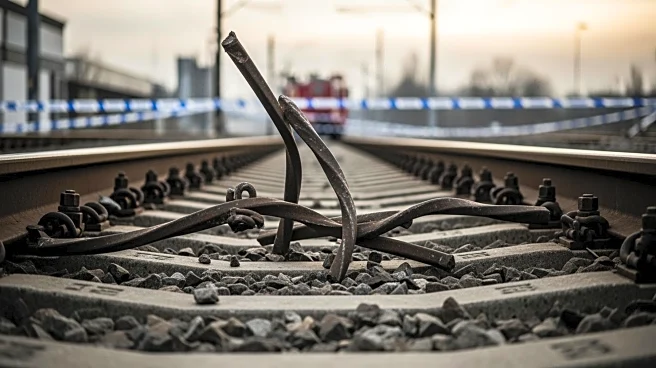What's Happening?
Polish Prime Minister Donald Tusk has confirmed that the explosion on the Warsaw-Lublin rail line was an act of sabotage. The incident involved an explosive device destroying a section of the track near
the village of Mika, crucial for aid delivery to Ukraine. While the perpetrators remain unidentified, the sabotage is linked to the ongoing Russia-Ukraine conflict. Deputy Interior Minister Maciej Duszczyk cautioned against immediately implicating Russia, though the possibility cannot be dismissed. The rail line is a vital route connecting Poland's capital to eastern regions and Ukraine, and the damaged section remains closed.
Why It's Important?
The sabotage of the rail track is a significant security concern for Poland, highlighting vulnerabilities in critical infrastructure amidst the Russia-Ukraine conflict. As a key ally of Ukraine, Poland's logistical routes are essential for supporting Ukraine's defense efforts. The incident reflects the broader challenges of hybrid warfare tactics, including sabotage and espionage, which threaten European security. Poland's response underscores its commitment to safeguarding infrastructure and maintaining support for Ukraine, despite geopolitical tensions.
What's Next?
Poland's investigation into the sabotage will involve security measures to prevent future incidents and protect critical infrastructure. The ongoing conflict may lead to increased security cooperation among European countries to counter hybrid warfare tactics. Poland's continued support for Ukraine, including advocating for its NATO accession, may influence future diplomatic and security strategies in the region. The incident may also prompt discussions on enhancing infrastructure security and defense capabilities across Europe.
Beyond the Headlines
The sabotage incident highlights the broader implications of the Russia-Ukraine conflict on European security. Poland's strategic position as a logistics hub for Ukraine makes it a target for hostile actions, emphasizing the need for robust security measures. The situation may lead to increased investment in infrastructure security and defense capabilities across Europe, as countries seek to protect critical assets and support allies.










